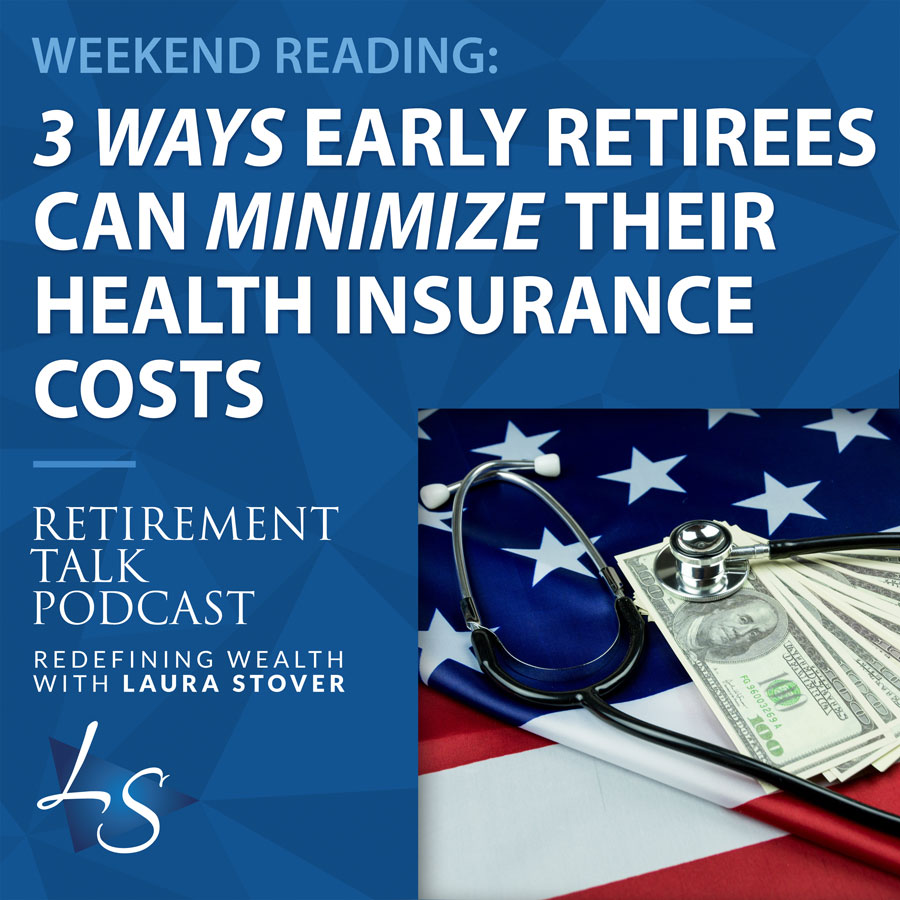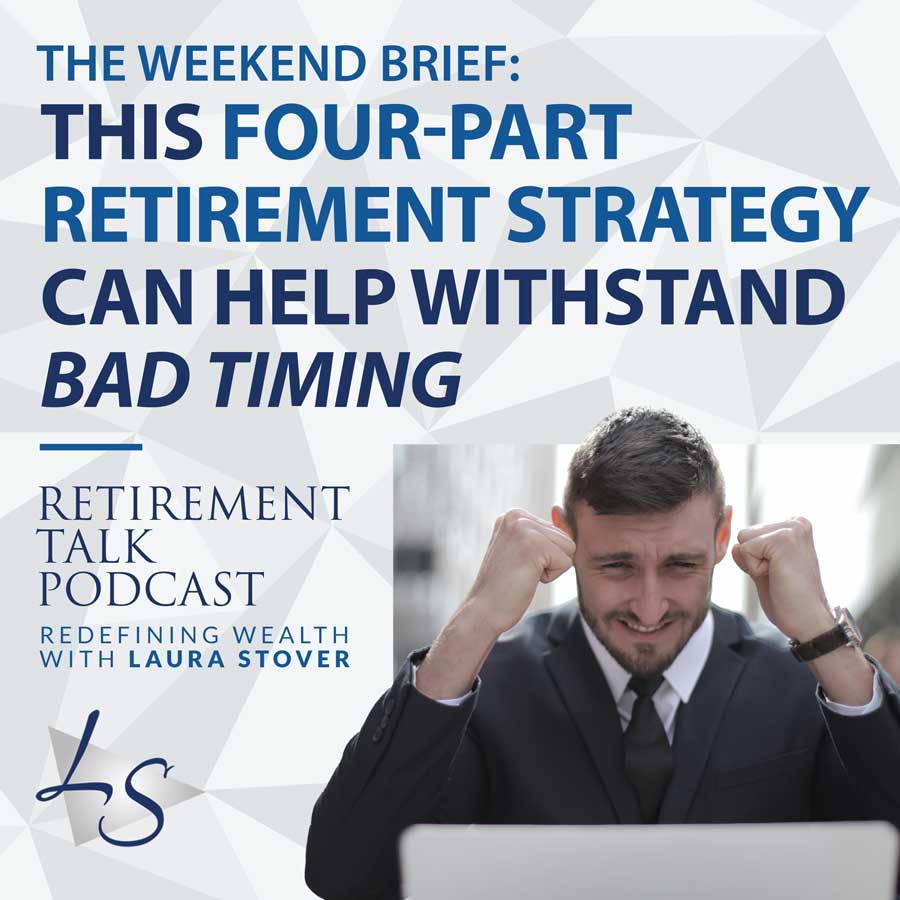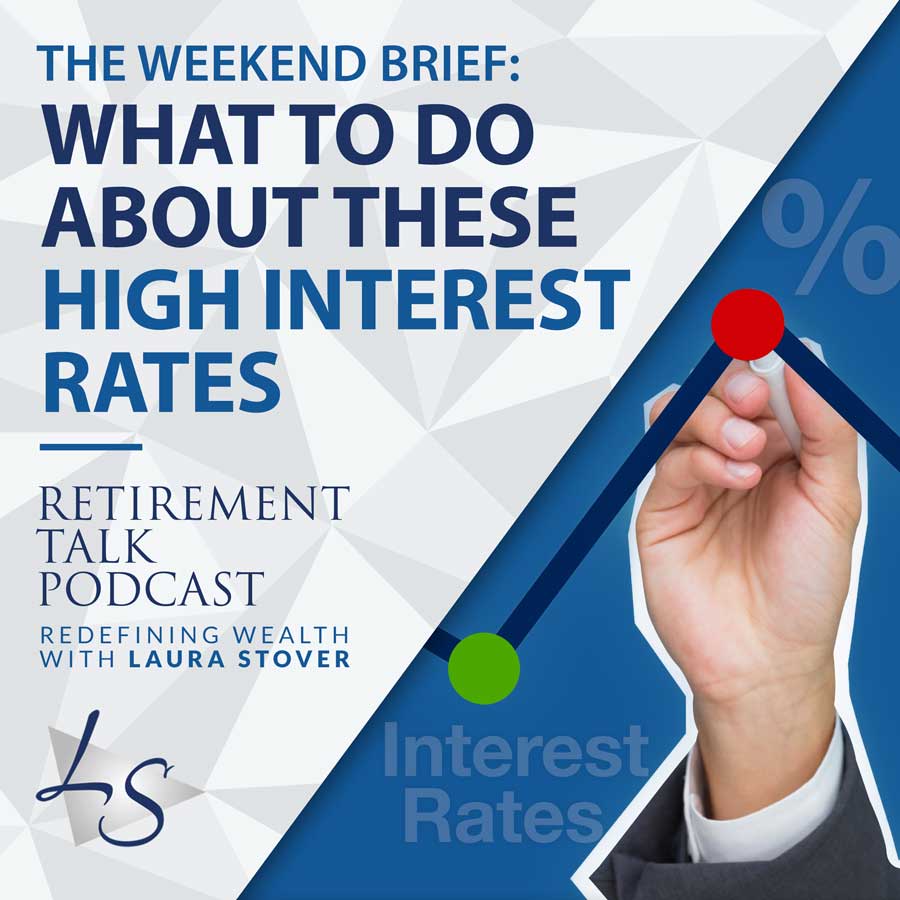We talk often about developing a plan for your retirement income and the strategies that go along with it. Have you considered how you’ll manage your the cost of health insurance? In today’s episode, we’re discussing three strategies that early retirees can minimize their health insurance costs.
Listen in as we cover a few investment opportunities, the impacts of certain federal acts, and understanding how to plan for your health insurance cost.
Review the article mentioned in today’s show >>
Rate & Review the Podcast on your favorite podcast app!
Sign Up for The Weekend Reading Email to read more on the featured podcast: redefiningwealth.info/weekend-reading
Show Notes
Health Insurance for Pre-Retirees (1:23)
Distribution of Retirement Accounts Creates Taxable Income (4:28)
Taxable Social Security Income (4:52)
Misconceptions of Municipal Bonds (5:23)
Healthcare & Income Planning (7:16)
American Relief Act (7:55)
Healthcare Sharing Programs (8:29)
Subsidy Expansion (8:57)
Higher Net Worth Level Enhanced Subsidies (11:21)
Affordable Care Act Impact for Unemployment Benefits (13:27)
Replacing Employer Tiered Health Insurance (14:33)
Strategy 1: Delaying Social Security (15:25)
Strategy 2: Minimizing Withdrawals from Retirement Accounts (17:53)
Convert Your IRA to Roth IRA (19:13)
Strategy 3: Build a Cash Cushion (21:30)
You need a plan before you retire. (24:05)
Links
Weekend Read: redefiningwealth.info/weekend-reading
Listen & Subscribe
Dan:
Welcome to Retirement Talk, the Redefining Wealth show specifically for pre-retirees and retirees to help you better understand and educate during these financial times. We are here to discuss thoughts and ideas as well as discuss trending topics that could impact your bottom line. These discussions can help you make better financial decisions and be informed so you can live the lifestyle you imagine and make better financial choices. Laura Stover is a registered financial consultant and CEO of LS Wealth Management, as well as founder and owner of LS Tax, a consulting firm. She’s been featured in Forbes, CNBC, and the Wall Street Journal. I’m Dan Irving. Our topic for today comes from our Weekend Reading edition from Kiplinger, three ways early retirees can minimize their health insurance costs. If you would like to learn more on today’s topic, you can head on over to redefiningwealth.info and subscribe to the Weekend Read. You’ll receive the Weekend Read each and every Friday along with Laura’s breakdown on the topics important to you and your retirement. Here are your hosts for Retirement Talk, Laura Stover, along with certified financial planner Michael Wallin. Welcome to the show.
Laura:
Hello, hello, hello. Dan, Michael, how’s everyone doing?
Michael:
Doing awesome. How are you doing today?
Dan:
Great, Laura.
Laura:
I am rocking and rolling away, and boy, do we have a good show. I say that every week. I’ll tell you what. My least favorite topic is health insurance, but we are going to talk about it today because it is so very, very important. Especially if you are pre-age 65, this show is especially for you. So that doesn’t mean that you should tune out if you’re over the age of 65, but there is a lot of questions that we’re filming on a day-to-day basis regarding this topic, and this is our Friday edition of the Weekend Reading, where we cover one of the four articles that I send out as part of that Weekend Reading email series each and every Friday. Simply just go on over to redefiningwealth.info. This is all trending topics in the financial planning space designed to help you make better decisions about your financial future.
Laura:
So sharing the article from Kiplinger, and I guess more than sharing, Michael, we’re going to deconstruct what I consider a kind of complex, controversial topic. It hits very close to home, though, for many people. So when I’m surfing through all of these articles each week to decide, it’s like, wow, should we talk about fed policy? Should we discuss inflation? There’s a lot of interesting topics, but three ways early retirees can minimize their health insurance costs. I think you can get a lot of in depth knowledge. Some changes has been made to this topic here recently. You can get a link to the article in the show notes. Just go to redefiningwealth.info and check out the podcast.
Laura:
So pre-age 65. We’ll cover some tips from this very timely topic, and most people do know that you have to be age 65 to apply and go on Medicare. You’ll need health insurance on your own, of course, up until that point, which can be pricey. It can be $1000 a month or more, sometimes just for one person. Small businesses also find themselves in a very precarious situation. It’s very expensive. We know that. Subsidies, however, through the Affordable Care Act can be a big help. They’re not triggered incidentally by your net worth. You could be a millionaire and you could find that you’re receiving some fairly substantial subsidies, so we’re going to discuss three tips today that could hopefully help you make better decisions along these lines.
Michael:
Yeah. One of the areas here, Laura, that we look at is when we’re sitting down with clients and we are looking at the income that’s coming in that they’re looking at to meet the income needs that they need during the retirement years, we look at the retirement accounts, we look at social security, we look at where is that income going to come from. And for many retirees, depending upon their retirement accounts to generate income between retirement and the date that they choose to start their social security income benefits, oftentimes they’re looking at those retirement accounts.
Michael:
Now, when distribution of income occurs from these types of accounts, it creates taxable income. All of our listeners understand that. They know that. They’ve got a retirement account. They’re taking money out. That’s going to be taxable income. Most retirees understand that this taxable income is added to one half of their social security benefits. That social security benefit is known as provisional income, and so that’s a new title of an income that some may not know what the official heading is, but one half of their social securities called provisional income once that social security benefit begins. The total income would be used in that formula, so if you take their taxable income and you take their provisional income, you add that together. That’s going to go into the formula to determine what is, or how much of their social security income, would be a taxable.
Michael:
Now, let’s identify another area that oftentimes retirees are unaware of. Retirees are often approached by individuals with the benefits of municipal bonds, and we’ve all heard about it. We’ve talked about it on prior shows. And here’s these municipal bonds being tax-free investments, at least at the federal level, but that’s not completely accurate. Muni bonds are generally exempt from federal and may be tax-free at the state level, but certain conditions have to be met. And many retirees have bought into this muni bond sizzle, tax-free interest income at the federal level, tax-free income at the state level, bottom line tax-free income. And we talk about this on the show all the time. We want to get our money to tax-free, but you got to know, are there other elements of tax-free that could negatively impact you?
Michael:
And what is often not shared is that interest income from municipal bonds are included in the modified adjusted gross income, the M-A-G-I. And so their MAGI is used to determine how much of their social security benefit is taxable. And this is where the uh-oh situation occurs. The broker never told me this could impact my taxation on my social security benefits.
Laura:
Do they ever?
Michael:
Oh, exactly. And so what actually happens is because that tax-free income is added back into that mixture with the other taxable income and the provisional income, now it increases their income level and more of their social security benefit now can become taxable during that time. And for those individuals, like you mentioned, that are prior to 65 in age before going on Medicare, it could come in and now reduce some or all of their subsidies for health insurance coverage.
Laura:
And we thought that health insurance has nothing to do with income planning. Think again. This is why everything starts and stops with a well-written income plan, why we utilize the Redefining Wealth process. It’s just so important. And interestingly enough, on a side note, looking at traditional methods of retirement income planning, there’s a lot of things that are shifting today. We talk a lot about the Roth. I think we did this a few shows back, how it was evolved in the late ’90s and it began to change some of that tax-free income strategies. And now here we are, fast forward, the American Relief Act. COVID created a lot of problems, and so this administration stepped up and created a bill recently that’s really opening the door to these subsidies to many, many more people with higher income, and with their stance on higher-income earners, this sort of surprises me, Michael. Kind of a double whammy.
Michael:
It did me as well.
Laura:
So, okay. I think it’s probably a misprint to be perfectly honest, but I’ve been sharing this with every client that signs up for healthcare, is what’s called a sharing program. And those healthcare sharing programs are prior to age 65. That keeps people’s health insurance costs down. Now there’s been quite an expansion with what the administration has done in regards to the subsidies because of the expansion, and a lot of them are getting off those healthcare sharing programs and hopping over into an exchange or a more traditional plan.
Laura:
So for 2021 and 2020, the subsidy expansion is an additional 3.7 million individuals are going to be eligible now for subsidies. Now, that’s providing an average savings of about $70 a month. I know you’re going to hit on this in a few moments a little more because it’s really important. And it may not seem like much for individuals that have a substantial income, but one thing that you probably don’t have a lot of the tax-exempt foreign income and some of those things, as you were stating, that affect those thresholds and the provisional income, and social security benefits being added back in its entirety, tax-exempt interest like on those municipal bonds. A lot of people don’t understand how that all does affect whether they’re going to qualify for these subsidies or not, so it’s quite an interesting equation. And health insurance costs may be very low, then come time to file taxes in 2021, some people may be shocked to find out they’re going to work longer because of the Medicare eligibility, and maybe they’re going to owe more tax because of their sources of income in regards to this whole subsidy situation.
Michael:
Yeah. And, Laura, when you mentioned a moment ago it may have been a misprint, I think oftentimes we see these laws that are written to create more of a… maybe a bipartisan approach, and they may include or throw the net a little bit wider to get the voter, to get it in. But like we have seen on so many other things, it’s where they come in and they close the door later on with another law or a follow-up exclusion, so something that might have been added at one time to get the law passed, and they’ll come in and refine that law much different.
Michael:
If they go for the listeners that go onto the Weekend Read and they pull this article up, I think it’s great. There’s a link inside of there that actually takes you to the law so you can actually read down through the law. And part of that is where you see where it says strike this out and add this additional phrase, and it’s rewriting the prior laws that have been put in place. So the American Rescue Plan, they lay it out very well on that document. So I would encourage everybody to go over to the Weekend Read, go in there, and select this article, because it’s some great information.
Michael:
And we have the high net worth and we have individuals that are already eligible for premium tax credits because their income is between 100% and 400% of the federal poverty level. Those individuals will receive higher subsidies under the American Rescue Plan. It’s a benefit for those that may be less fortunate, less income. It’s going to give them higher premium tax credits. For instance, those with incomes from 100% to 150% of the federal poverty level are newly eligible for no-premium coverage, so that has expanded there. They contribute no income towards premiums for if… and all of this example here that I’m sharing is against the silver benchmark plan. And for those that go out there and take a look at it, they’ll be able to see this. So under the prior law, they were required to contribute up to 2% of their income in premiums to be able to qualify for this plan. Now, that’s going to go in and say, okay, well, it’s no premiums at all.
Michael:
So let’s just say if you have an individual that’s making, for easy calculation, $20,000. Well, prior, they were having to pay $400 in premium, which was 2% of their income. Now they’re not going to have to pay that $400. That’s an additional benefit for individuals at that level. The amount that an individual must contribute towards premiums does rise as the income increases, but it is ultimately now capped at 8.5% of the household income. Now, that’s 400% above the federal poverty level, but it is down from the original Obamacare that was at 9.83%. So in that same example, that if you now have an individual that is at that higher net worth level, they’re going to be at 0.5% versus 9.83% of their household income level to be paying for this. So both types of these enhanced subsidies are available for calendar years 2021 and 2022.
Michael:
There’s a third level, which is individuals who receive or are approved to receive unemployment benefits at the time during 2021. Those individuals may be eligible for maximum subsidies under the Affordable Care Act. Their income will be treated as no higher than 133% of the federal poverty level, meaning that those qualifying individuals will receive the maximum amount of cost-sharing reductions to lower their out-of-pocket cost. So these provisions extend to those who are newly eligible to enroll, or those that are already on the Affordable Care coverage, as well as those that are going through the current marketplace to enroll now. So each of those are available in 2021. So if people are looking at healthcare, they really need to take a look as this new plan is in place, take a fresh look, new set of eyes on what would the premiums be, and is it a better solution for them for their healthcare now.
Laura:
This act also eliminates the requirement to pay back tax credits in excess of that adjusted income. If you lost your employer tiered health insurance during the pandemic, the government will pay the entire COBRA premium through September of the current year. So better insurance coverage is, for the time being, available right now. Take advantage at an all-time lower price than normal, although it’s still too high. This will not continue past 2022 unless Congress acts to make it permanent.
Laura:
In the meantime, if you’re thinking about retiring, some of these strategies we want to discuss today, they’re designed to help you reduce your health insurance costs between retirement and by the age 65, by maximizing the savings that you can receive now through the ACA subsidies. While it’s also important to obtain a subsidy, you want to be comfortable and sustain and live your retirement lifestyle.
Laura:
So the first strategy is delaying social security. People should consider doing this anyhow. They really need to go through social security timing, the income planning component of this. Again, how much you get in social security depends on a sliding scale. It’s set by the Social Security Administration based on your age, how many years you’ve worked, how much you’ve contributed to social security when you go to claim. And you can claiming at the age of 62, but the payments rise. It’s about 6.25% up to the full retirement age, where most people is, 66 in so many months, then it would maybe roll up approximately 8% to the maximum age of delay, which is 70. So that’s important to have a plan with when you take it. Most people say, oh, I’m just going to take it as quick as possible because it’s going to blow up. We talked about that last week. That is not the case. You need a strategy.
Michael:
Coordination of benefits. We so often sit down, we talk with our clients that it’s not maximization. It’s not as quick as you can take it. It’s about coordination and delaying claiming your social security. If you have the ability to do that, it is so beneficial for your entire retirement strategy because it results in higher ongoing income. When you could really need it in the middle or late retirement. Married couples especially can take advantage of social security claim strategies to minimize healthcare costs.
Michael:
For example, if you’ve got a lower earning partner, those individuals could go ahead and claim their benefit now, while the higher wage earner continues to defer their portion or their benefit to age 70. Go ahead and build your budget around that lower income earner now. Maximize that benefit. Like you said, it’s an 8% simple increase from whatever your full retirement age is up to age 70. For some people retired at 66, that’s a 32% increase in their benefit. For others, it still could be a 25% or better increase in their benefits. So when you look at that, that is the benefit that actually would be left to the surviving spouse as well. So it’s not just about taking care of the married couple’s budget today, but when the lower of the two social security benefits goes away, that higher benefit is going to be there to help sustain that surviving spouse throughout their remaining retirement years.
Laura:
Another strategy, number two, is minimizing withdrawals from retirement accounts, well, along with social security, having a strategy, a coordination of benefits withdrawals from 401ks, IRAs, similar types of accounts. Now, they’re all counted toward the income that determines the level of healthcare subsidy you get. Therefore, if you want to retire early… Who doesn’t want to retire early? I don’t think I do. I love doing paperwork. It’s important to avoid withdrawing large sums from tax deferred retirement accounts that could impact your potential subsidy. So if you aren’t required to take a distribution until you’re age 72 now, because of the SECURE Act, careful planning really could help you avoid the kinds of excessive withdrawals that may negatively impact your health insurance costs. So, Michael, they could consider boosting those withdrawals from an IRA, maybe in the year or years before you retire, allowing coordination of benefits, putting some of that money aside in a liquid savings account, or then you could ultimately tap in early retirement to pay your expenses between when you retire in that age of 65.
Laura:
And if you have some wiggle room in tax planning right now, you should also think about converting the IRA into a Roth IRA. How many times have we said that? That’s like, write this on the chalkboard a hundred thousand times. We have said convert your IRA into a Roth IRA to reduce the taxes you’ll have to pay once you’re retired and taking distributions. Our Fed chair, Miss Janet Yellen, just recently asked for what, Michael? They need to raise the debt ceiling.
Michael:
Blow that ceiling off of the roof.
Laura:
Why don’t we just have a sun roof or a convertible? Why do we need to have a ceiling all the time?
Michael:
The universe is the limit.
Laura:
Because we are going to be in higher taxes. We know this down the road. It’s a myth to think we’re going to be in a lower tax bracket down the road. It’s just a matter of time. Rather, we wait for the Trump tax act of 2017 to sunset, or we know that this administration has made it very vocal on some major tax reforms of all types and different flavors of taxes. So if you already have a Roth, you also could make early withdrawals then if necessary, because the beauty of it is those Roth withdrawals are not counted toward income under the Affordable Care Act.
Dan:
You are listening to the Retirement Talk podcast. We are talking today about tips for reducing your health insurance coverage cost with Laura Stover and Michael Wallin. If you would like to read more on today’s topic, you can take advantage of a free subscription to the Weekend Read. Just go to redefiningwealth.info and click Subscribe. You will stay on top of all the latest news and financial trends. Finally, we want to invite you to our upcoming webinar. Laura and Michael will take a deep dive into important concepts that will help educate you on making informed decisions for your retirement. These resources are available to you by going to redefiningwealth.info. Subscribe to the Weekend Read. We help get you on track and stay the course. Now back to Retirement Talk, the Redefining Wealth show with Laura Stover and Michael Wallin.
Laura:
And the third strategy, Michael, build a cash cushion. That sounds pretty good. Doing all these great things. We’re getting our Roth accounts so we have plenty of tax-free money. We’re having a coordination of benefits so our social security is timed and maximize in the right way. We’re getting all of our ducks in a row at the years immediately before retirement. Well, there’s certainly a lot you can do to limit your exposure to any unexpected healthcare costs before you retire, and you should generally be directing any additional savings towards more liquid savings accounts. Now, they’re for a purpose. There’s different ways you can ladder these types of accounts that can help really enhance that cash cushion. And as you age and retire, all the more reason that cash cushion needs to be a little bigger.
Laura:
Consider capital gains from taxable investments. They’re eyeing raising this on non-qualified accounts. Well, you could put them in this cash cushion as well. Do the same with any sudden windfall you get, when I win the lottery, when that Powerball comes due, a bonus from your job. A lot of folks receive inheritance or gifts. The idea is to build this liquid savings account up so it’ll cover all or most of your expenses in an HSA account in the year or years between your retirement and age 65, when you can then finally access Medicare. To be clear, this cash cushion isn’t merely designed to pay your healthcare expenses. It’s a bigger purpose. It’s redefining your wealth. It’s ensuring that you’re living the retirement lifestyle you imagine before retirement.
Michael:
Those golden years, or for many it’s the platinum years now, but it’s the years many retirees, they take on part-time work to provide extra income that will cover the gap between their expenses on one hand and their savings and social security income on the other. A strategy well worth considering in these intermediate years is to create that cash cushion with that excess or extra income and make sure it’s there available to you so that you can mitigate that taxable income in the future without having to take from that retirement accounts, and then ultimately keep that social security benefit intact and not increase that Medicare premium.
Laura:
And in order to do all of this, we need what? I’ll throw Dan in the mix here. Dan, you’re doing a stellar job by the way.
Dan:
Thank you.
Laura:
So everyone needs a what before they retire? Starts with a P.
Dan:
They need a plan.
Michael:
A plan.
Laura:
They need a plan. Dan, you need a plan.
Michael:
Right.
Laura:
And without a plan, my Bears, clearly when they played the Browns recently, they needed a new plan. I can’t even imagine that they had a plan. And without a plan, in all seriousness, so many people are so geared and focused towards products. Why do you own what you own? What is the tax plan? What is the income plan? Where are you taking the income? How are you coordinating the income? All the tax ramifications, provisional, capital gains, ordinary tax, marginal tax, effective tax rate. If you do not have a healthcare plan, which is what we’re talking about today and coordinating all of these pillars, and then finally the estate plan that is part of the Redefining Wealth process, it requires coordination of all of those very important pillars.
Laura:
And in the years before we turn 65, like you said, many retirees take on that part-time work. Maybe they want to do something to give back to the community, still stay vital, still stay active. When you retire, that doesn’t necessarily mean you sit and watch the news all day. You’re doing things with your kids. You’re taking trips. You are traveling again. You’re doing things. You’re living. And the bottom line, income strategies will help keep you in the subsidy range. Prepare in advance. Like we said, delay your social security benefits. The average benefit for social security is roughly $1500 a month, $18,000 a year. That’s 138% of the poverty level for an individual, so you receive a pretty stiff subsidy. A couple would be about $24,000 on average for social security benefits, maybe $36,000 a year. Now you’re at 200% of the federal poverty level. It doesn’t take much to push you over the top for that subsidy.
Michael:
Healthcare expenses, Laura, in retirement can create headaches. We talk to clients as they’re going into this, and one of the biggest concerns that they always talk about is their healthcare and how is that going to be paid for, and what’s it going to cover. And I know it’s a concern, it’s a headache, and even negative financial consequences can be created from it by delaying social security and in minimizing those withdrawals from IRAs and other retirement accounts early in retirement, those individuals can maximize the health insurance subsidies that they receive under the Affordable Care Act. It’s very easy to restructure, realign how that money is coming out before retirement. They can act to build up a liquid savings account to meet health-related expenditures as well. So there’s strategies. They just need to sit down and build a plan that has purpose that gives them the best off opportunities and benefits for the future.
Laura:
If you want a link to the article again, check it out in the show notes. We’ll be getting you a new article each and every Friday. Go over to redefiningwealth.info. Subscribe for free to the Weekend Read.
Dan:
Schedule a strategy session with Laura and Michael virtually or in person. Just go to redefiningwealth.info. You can also subscribe to the Weekend Read there as well. That’s redefiningwealth.info.
Dan:
Redefining Wealth is a registered trademark of LS Wealth Management. Investing involves risk, including the potential loss of principal. Any references to protection, safety, or lifetime income generally refer to fixed insurance products, never securities or investments. Insurance guarantees are backed by the financial strength and claims paying abilities of the issuing carrier. This show is intended for informational purposes only. It is not intended to be used as the sole basis for financial decisions, nor should it be construed as advice designed to meet the particular needs of an individual situation. LS Wealth Management LLC is not permitted to offer and no statement made during the show shall constitute tax or legal advice. Our firm is not affiliated with or endorsed by the US government or any governmental agency. The information and opinions contained herein provided by third parties have been obtained from sources believed to be reliable, but accuracy and completeness cannot be guaranteed by LW Wealth Management LLC. Investment advisory services offered through Optivise Advisory Services, an SEC-registered investment advisor. LS Wealth Management is a separate entity.












